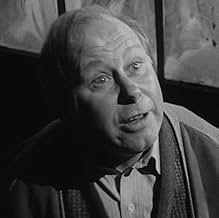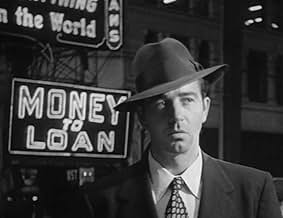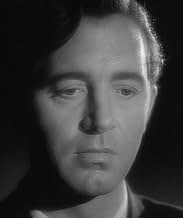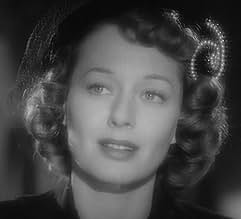IMDb RATING
6.6/10
1.7K
YOUR RATING
War hero recovers from amnesia and is confronted by his criminal past.War hero recovers from amnesia and is confronted by his criminal past.War hero recovers from amnesia and is confronted by his criminal past.
- Awards
- 2 wins total
Hal Baylor
- Coke
- (as Hal Fieberling)
Charles Evans
- Police Capt. Anderson
- (as Charlie Evans)
Chet Brandenburg
- Diner Customer
- (uncredited)
- …
Frank Cady
- Barnes - Man at Bar
- (uncredited)
- Director
- Writers
- All cast & crew
- Production, box office & more at IMDbPro
6.61.7K
1
2
3
4
5
6
7
8
9
10
Featured reviews
Two Johns (Payne and Alton) make obscure amnesiac-veteran noir worth reviving
One measure of The Crooked Way's obscurity may be that the only copy I could track down was subtitled in Hebrew. That obscurity is puzzling, because the movie is, if not a superior, certainly an above-average entry in the noir cycle. It boasts John Payne as its star, but before Phil Karlson groomed him into an archetypal noir protagonist. What's more, none other than John Alton was cinematographer, casting his customary shadowy spell; while he doesn't scale the dark peaks he did in collaboration with Anthony Mann, he makes French-born director Robert Florey's film look very good very ominous indeed.
But The Crooked Way stays eclipsed by a movie of three years earlier eerily close in theme and milieu, Somewhere in the Night, starring John Hodiak. Hodiak and Payne both play amnesiac veterans trying to reconstruct their troubling pasts in journeys through the underbelly of Los Angeles.
In The Crooked Way, Payne, having won a Silver Star but lost his memory, gets discharged from a veterans' hospital and heads `home;' that he hails from L.A. is all he knows about himself. But at Union Station, two police detectives meet him, calling him Eddie Riccardi (so far as he knows, he's Eddie Rice). Five years earlier, as it turns out, Payne worked for mob boss Sonny Tufts, whom he set up then fled to the Army; he was married to Ellen Drew, also connected to the syndicate. Ultimately, Payne finds himself hounded by the police and beaten by the mob, then framed for murder. He's running for his life and out of people he's told he can rely on....
Payne, with his brooding eyes and impassive visage, makes a more convincing vet and victim than Hodiak, but, apart from that, the story gets told conventionally. That raspy-voiced gnome Percy Helton scuttles around as one of Tufts' eye-and-ear operatives, and Drew gets some tough moments in strapless gowns (though inevitably, when her character softens, she goes bland). Still, it's a solid noir that deserves rehabilitation if for no other reason than that it preserves Alton's precious photography.
But The Crooked Way stays eclipsed by a movie of three years earlier eerily close in theme and milieu, Somewhere in the Night, starring John Hodiak. Hodiak and Payne both play amnesiac veterans trying to reconstruct their troubling pasts in journeys through the underbelly of Los Angeles.
In The Crooked Way, Payne, having won a Silver Star but lost his memory, gets discharged from a veterans' hospital and heads `home;' that he hails from L.A. is all he knows about himself. But at Union Station, two police detectives meet him, calling him Eddie Riccardi (so far as he knows, he's Eddie Rice). Five years earlier, as it turns out, Payne worked for mob boss Sonny Tufts, whom he set up then fled to the Army; he was married to Ellen Drew, also connected to the syndicate. Ultimately, Payne finds himself hounded by the police and beaten by the mob, then framed for murder. He's running for his life and out of people he's told he can rely on....
Payne, with his brooding eyes and impassive visage, makes a more convincing vet and victim than Hodiak, but, apart from that, the story gets told conventionally. That raspy-voiced gnome Percy Helton scuttles around as one of Tufts' eye-and-ear operatives, and Drew gets some tough moments in strapless gowns (though inevitably, when her character softens, she goes bland). Still, it's a solid noir that deserves rehabilitation if for no other reason than that it preserves Alton's precious photography.
If Only the Script Matched the Quality of the Images
Amnesia is not the most original plot gimmick in film. From "Random Harvest" and "Spellbound," from "36 Hours" to "Mirage," from "Memento" to "The Bourne Identity," characters have wrestled with memory loss and struggled to find out who they really were. World War II veteran Eddie Rice has a piece of shrapnel lodged in his brain that has caused his loss of memory, and, once released from the hospital, Eddie heads to Los Angeles, where he hopes to find people who knew him in the past. Handsome John Payne is Eddie, the man in search of his identity in "The Crooked Way," a brilliantly photographed, but otherwise routine film noir. Adapted from a radio play, the derivative plot utilizes voice over to convey Eddie's thoughts and depends on improbable coincidences to bring characters together. Needless to say, Eddie quickly runs into his past, and what he finds plunges him into a murky underworld of gangsters, gunfights, and murder.
With his dark brooding looks, Payne is credible in the undemanding role, and he has solid support from Ellen Drew, the forgotten wife with a new life; Sonny Tufts, a tough gangster boss with a long memory; and Rhys Williams, a policeman who digs into Eddie's criminal past. However, the lazy plot and solid cast are enhanced by John Alton's masterful black-and-white cinematography, which evokes Martin Lewis etchings in its use of light and shadow. Deep black hallways and streets lead to glaring white lights, the slats of Venetian blinds throw bars of shadow across faces, heads are silhouetted while speaking, the lettering on a plate glass window casts words across an office wall, characters are lit from below, white-hot hanging lamps illuminate gaming tables. Alton's outstanding work demands to be studied for its composition, lighting, and focus. Although Alton won an Oscar for his color work on "An American in Paris," his images on any number of film noir and especially this one should have garnered him numerous nominations and wins. Alton's cinematography defines the best in film noir.
While the "Crooked Way" is often cliched and predictable, a solid cast and especially John Alton's images lift the film to essential viewing. John Payne fans should also be pleased, as well as aficionados of amnesia movies. Evidently, loss of memory is more prevalent among characters in Hollywood movies than among the general populace.
With his dark brooding looks, Payne is credible in the undemanding role, and he has solid support from Ellen Drew, the forgotten wife with a new life; Sonny Tufts, a tough gangster boss with a long memory; and Rhys Williams, a policeman who digs into Eddie's criminal past. However, the lazy plot and solid cast are enhanced by John Alton's masterful black-and-white cinematography, which evokes Martin Lewis etchings in its use of light and shadow. Deep black hallways and streets lead to glaring white lights, the slats of Venetian blinds throw bars of shadow across faces, heads are silhouetted while speaking, the lettering on a plate glass window casts words across an office wall, characters are lit from below, white-hot hanging lamps illuminate gaming tables. Alton's outstanding work demands to be studied for its composition, lighting, and focus. Although Alton won an Oscar for his color work on "An American in Paris," his images on any number of film noir and especially this one should have garnered him numerous nominations and wins. Alton's cinematography defines the best in film noir.
While the "Crooked Way" is often cliched and predictable, a solid cast and especially John Alton's images lift the film to essential viewing. John Payne fans should also be pleased, as well as aficionados of amnesia movies. Evidently, loss of memory is more prevalent among characters in Hollywood movies than among the general populace.
The Crooked Way (1949)
The story, about a returning war veteran with amnesia discovering his criminal past, is remarkably similar to SOMEWHERE IN THE NIGHT from a few years earlier. Plotwise, it's not nearly as compelling as its predecessor. The amnesia angle really isn't exploited well and what's left is a rather uninteresting gangster story with bland characters. Decent performances from Payne, Tufts and Drew, but only Percy Helton really stands out. However, this has to be one the best-looking noirs out there, thanks once again to the talents of John Alton. Incredible shocks of bright light amidst deep shadows, unusual framing, dramatic angles, gritty locations... the entire picture is simply gorgeous, textbook noir. It's a shame that such impressive visuals aren't attached to a more engaging plot, but it's still a delight to behold.
Enjoyable drama but the script and Payne fail to make good on the potential in the sweep of story and characters
War hero Eddie Rice returns to his home town as a result of a serious head injury that has left him with no real memory of who he is and nothing in his files that suggests where he should go. He decides to hang around ad hopefully meet someone he knows who will introduce him to another and another until his life is back in focus. What he doesn't reckon on though is that the first people to recognise him will be the police who don't buy the idea that violent hood Eddie Riccardi has "lost his memory". This is a sentiment that gangster Vince Alexander shares when he discovers that the man who turned states evidence against him is back in town.
An interesting concept in this film. The idea that a "war hero" comes back to discover that really he was a violent criminal, a man he himself would have disliked and that he has to deal with the consequences of a past that he has no recollection of. In theory it could have been tough and morally complex and indeed I was hoping that these aspects would make for a dark and strong crime drama. In a way the actual product was both satisfying and a bit disappointing. The plot provides some good drama. It doesn't all ring true and it lacks the moral uncertainty that I had hoped for but it does still work well enough for what it is. If anything the script doesn't totally deserve Florey as director because the latter does do a solid job of working in the shadows and of framing shots to maximise the darkness within them.
The script doesn't make this same effect work within the story or characters though and indeed ethically it is perhaps too simplistic, with Eddie himself being disappointedly disconnected from his past. Of course I have to acknowledge that in this regard John Payne is miscast. He never convinces as a man struggling with anything (other than a sleepy delivery) and there is never a connection to his past in anything he does. Contrast his performance (and indeed what this film does) with Mortensen in "A History of Violence" and you can see where he and the material really don't deliver all they could (should) have done. Tufts works better but in fairness perhaps has a simpler character to pull off. He is a typically tough bad guy, full of patience and menace in his delivery I liked his scenes but he conspires to make Payne seem weaker by comparison. Drew, Williams, Helton and others all do well enough for what is asked of them but the main expectation was on Payne and the film cannot shake the feeling that he is just not up to the task.
Overall then a solid enough drama but not up to the standard that it had the potential to be. Florey's direction works well with the cinematography (which is perhaps typical for the genre but still good) and it is just a shame that neither the script nor Payne are able to make more out of the potential within the sweep of the story and characters.
An interesting concept in this film. The idea that a "war hero" comes back to discover that really he was a violent criminal, a man he himself would have disliked and that he has to deal with the consequences of a past that he has no recollection of. In theory it could have been tough and morally complex and indeed I was hoping that these aspects would make for a dark and strong crime drama. In a way the actual product was both satisfying and a bit disappointing. The plot provides some good drama. It doesn't all ring true and it lacks the moral uncertainty that I had hoped for but it does still work well enough for what it is. If anything the script doesn't totally deserve Florey as director because the latter does do a solid job of working in the shadows and of framing shots to maximise the darkness within them.
The script doesn't make this same effect work within the story or characters though and indeed ethically it is perhaps too simplistic, with Eddie himself being disappointedly disconnected from his past. Of course I have to acknowledge that in this regard John Payne is miscast. He never convinces as a man struggling with anything (other than a sleepy delivery) and there is never a connection to his past in anything he does. Contrast his performance (and indeed what this film does) with Mortensen in "A History of Violence" and you can see where he and the material really don't deliver all they could (should) have done. Tufts works better but in fairness perhaps has a simpler character to pull off. He is a typically tough bad guy, full of patience and menace in his delivery I liked his scenes but he conspires to make Payne seem weaker by comparison. Drew, Williams, Helton and others all do well enough for what is asked of them but the main expectation was on Payne and the film cannot shake the feeling that he is just not up to the task.
Overall then a solid enough drama but not up to the standard that it had the potential to be. Florey's direction works well with the cinematography (which is perhaps typical for the genre but still good) and it is just a shame that neither the script nor Payne are able to make more out of the potential within the sweep of the story and characters.
More Dark Shadows Along The Crooked Way Than Any Noir Fan Could Ask For
In the series of tough crime melodramas he made during the late 1940's and early 1950's John Payne invariably seems to be looking for something. In Kansas City Confidential (1952) it was the stolen loot from a robbery. In 99 River Street (1953) it was the thug who framed him for murder. In The Crooked Way (1949) it was something much more basic -- his very identity.
Payne plays Eddie Rice, a WW II veteran recovered from the physical effects of a head wound but suffering a complete and permanent amnesia. He has no memory of his life before regaining consciousness in a hospital. All he knows about himself is what the Army has told him, that he enlisted in Los Angeles. When discharged from the hospital, he takes a train to L. A. to try and find out who he is. What he finds is more than he really wanted to know! That he was a hoodlum named Eddie Riccardi. That he has a wife (Ellen Drew), but she now hates his guts. That his former gangster partner, played with evil oozing from every pore by Sonny Tufts, is bent on beating him up, framing him for murder, and even more nasty things.
How Eddie muddles though this dark nightmare of a past coming back to haunt him and how it is presented by director Robery Florey and cinematographer John Alton adds up to a classic forgotten gem of a noir thriller. The Crooked Way exhibits the classic elements of film noir -- a morally ambiguous protagonist, a femme fa-tale, a grim, brutal story, and the most starkly shadowed and obliquely angled cinematography found in any movie. Most of the scenes are at night, and Alton's camera throws a tenebrist gloom over every shot with only the speaker's face lighted. Sometimes all figures are silhouettes, then the face gradually comes to light. A tall man looks down at a short man, and the view is as from a second story window. All this dark, oblique cinematography is not only arty and thrilling on its on to noir groupies, but it works perfectly to portray the dream-like state Eddie is experiencing. The story moves along briskly under Florey's direction and Frank Sullivan's editing. The action is explosively sharp and brutal.
John Payne was perfectly cast in the part of Eddie, maintaining a blank, confused expression you would expect from an amnesiac, even when getting tough. Getting tough was an item that John Payne, an ex-boxer and a WWII veteran in real life, was good at in spite of his mild, laid back manner. He was at this point starting to mature as a tough guy actor after abandoning his original song and dance career at least in part because he got too weathered and muscled up. Payne seems to be an acquired taste amongst present day lovers of classic movies, but I've acquired it and am now looking for all of his pictures.
The Crooked Way, while a cut below Kansas City Confidential and 99 River Street, is one of John Payne's best.
Payne plays Eddie Rice, a WW II veteran recovered from the physical effects of a head wound but suffering a complete and permanent amnesia. He has no memory of his life before regaining consciousness in a hospital. All he knows about himself is what the Army has told him, that he enlisted in Los Angeles. When discharged from the hospital, he takes a train to L. A. to try and find out who he is. What he finds is more than he really wanted to know! That he was a hoodlum named Eddie Riccardi. That he has a wife (Ellen Drew), but she now hates his guts. That his former gangster partner, played with evil oozing from every pore by Sonny Tufts, is bent on beating him up, framing him for murder, and even more nasty things.
How Eddie muddles though this dark nightmare of a past coming back to haunt him and how it is presented by director Robery Florey and cinematographer John Alton adds up to a classic forgotten gem of a noir thriller. The Crooked Way exhibits the classic elements of film noir -- a morally ambiguous protagonist, a femme fa-tale, a grim, brutal story, and the most starkly shadowed and obliquely angled cinematography found in any movie. Most of the scenes are at night, and Alton's camera throws a tenebrist gloom over every shot with only the speaker's face lighted. Sometimes all figures are silhouettes, then the face gradually comes to light. A tall man looks down at a short man, and the view is as from a second story window. All this dark, oblique cinematography is not only arty and thrilling on its on to noir groupies, but it works perfectly to portray the dream-like state Eddie is experiencing. The story moves along briskly under Florey's direction and Frank Sullivan's editing. The action is explosively sharp and brutal.
John Payne was perfectly cast in the part of Eddie, maintaining a blank, confused expression you would expect from an amnesiac, even when getting tough. Getting tough was an item that John Payne, an ex-boxer and a WWII veteran in real life, was good at in spite of his mild, laid back manner. He was at this point starting to mature as a tough guy actor after abandoning his original song and dance career at least in part because he got too weathered and muscled up. Payne seems to be an acquired taste amongst present day lovers of classic movies, but I've acquired it and am now looking for all of his pictures.
The Crooked Way, while a cut below Kansas City Confidential and 99 River Street, is one of John Payne's best.
Did you know
- TriviaThe La Rue as seen in the film was a famous restaurant at 8361 Sunset Blvd. on the Sunset Strip.
- GoofsThe train depicted as taking Eddie from San Francisco (where Letterman Army Hospital was) to Los Angeles is actually a Pennsylvania Railroad streamlined K4 locomotive, shown on their three-track mainline. This shot has been used in other films.
- Quotes
Eddie Rice: [to Nina Martin] Keep your lights off and the motor running.
- ConnectionsReferences Pitfall (1948)
- How long is The Crooked Way?Powered by Alexa
Details
- Release date
- Country of origin
- Language
- Also known as
- Der Herr der Unterwelt
- Filming locations
- Union Station - 800 N. Alameda Street, Downtown, Los Angeles, California, USA(Eddie Rice's arrival by train in Los Angeles. specifically the main entrance under the distinctive signage.)
- Production company
- See more company credits at IMDbPro
- Runtime
- 1h 30m(90 min)
- Color
- Aspect ratio
- 1.37 : 1
Contribute to this page
Suggest an edit or add missing content








































